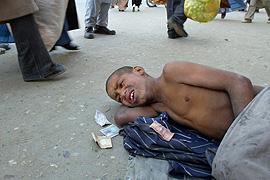Ben Doherty
LOOMING over the dusty, noisy metalworkers' lane in Kabul is a gleaming skyscraper. Daily, the building's shadow sweeps over the wooden workshops. And then it is gone.
It is a fitting metaphor for this city's two-speed economy.
''We work 100 metres from these buildings,'' metalworker Kazem says, ''and less than a kilometre from the presidential palace - but we have no electricity.''
He reaches into one side of his waistcoat, taking an imaginary wad of cash out and transferring it to the opposite pocket.
''There is money in Kabul, but they don't use [it] to help people. They make just like this: take the money from one pocket to the other.''
Afghanistan's capital has boomed over the past decade, but many Afghans say they've seen little of the benefit. They worry about what will happen to the economy - and their security - when foreign forces and their foreign money leave.

An Afghan beggar. (Photo: Gallo/Getty)
Today, there are two Kabuls. The city has grown from about 1.5 million people to more than 5 million in the past decade as Afghans, seeking work and safety, flood the capital. Gleaming new malls and apartment complexes have sprung up for the rich, countered by swelling, crowded shanty towns for the poor.
Afghans who win contracts with embassies, international NGOs or foreign contractors can earn $US1500 ($A1360) a month. Public-sector worker wages remain between $US50 and $US250 a month. Kazem, 31 and with three young children, earns far less.
The most lasting change he has seen is a near-trebling of the rent for the workshop he shares, from 3000 afghanis ($A58) a month, to more than 8000.
''We don't need aid, we don't need food, we need security,'' he says. ''When security is good, business is good.''
Thomas Ruttig, co-director of the Afghanistan Analysts Network, says the money that has flooded Afghanistan in the past decade has created an economic bubble- and a false sense of security - in Kabul.
''I quote here an Afghan friend of mine: 'The day the West stops paying for the Afghan army and the Afghan police, the next day there is no Afghan army or Afghan police any more','' Mr Ruttig says. ''That's a very tough thing to say - very dramatic, and probably a little bit exaggerated - but I think only a little bit.''
Manufacturing barely exists, and efforts to create a mining sector from the land's mineral wealth have failed. ''The biggest part of the economy that is left is drugs … somewhere around 11 per cent of the Afghan population is involved in the drug economy,'' Mr Ruttig says.
With an end-date set for Western troops to pull out of the country, Afghans are looking beyond 2014.
''Most of the governments say - some on the record, most off the record - 'when the soldiers leave, the money will also leave','' Mr Ruttig says.
''A lot of money is now going out of the country because people need insurance for post-2014, and that includes the government.''
In central Kabul, 23-year-old Parwiz Chakari manages his family's chic fashion house, Tolo Shopping.
Chakari says while there are more people with money in their pockets, they're still only a small fraction of the population.
''If the Americans do leave in 2014, the security might go bad, civil wars might start again. But I am not sure the Americans will definitely leave.''
Afghanistan has never been allowed to develop a peacetime economy, Chakari explains. For all of his life, his country has been occupied or at war with itself.
Our conversation is interrupted by a woman in a burqa who comes into the shop begging for money.
''This is the real economy in Afghanistan,'' Chakari says, shaking his head. ''People are still just trying to survive.''



